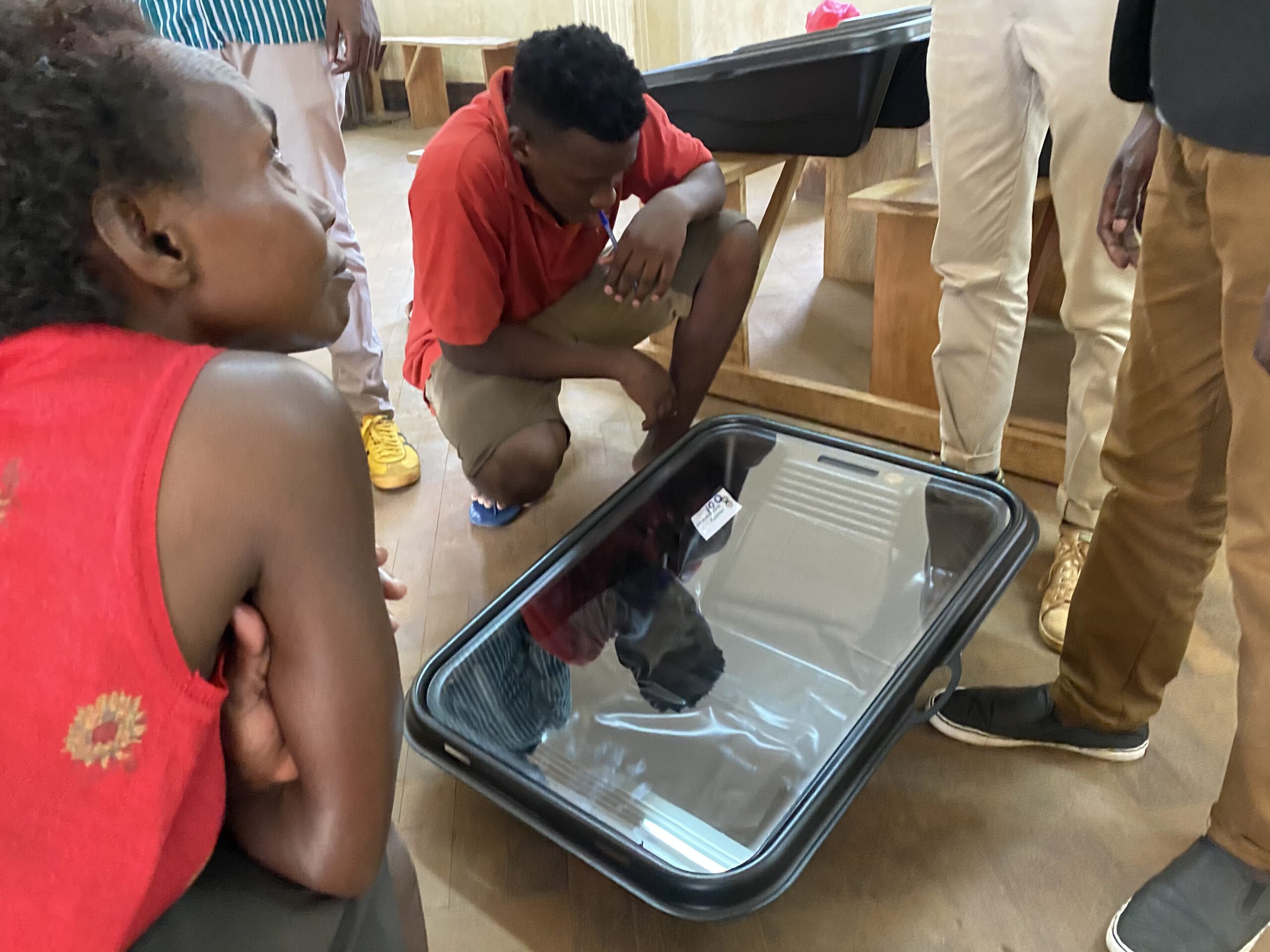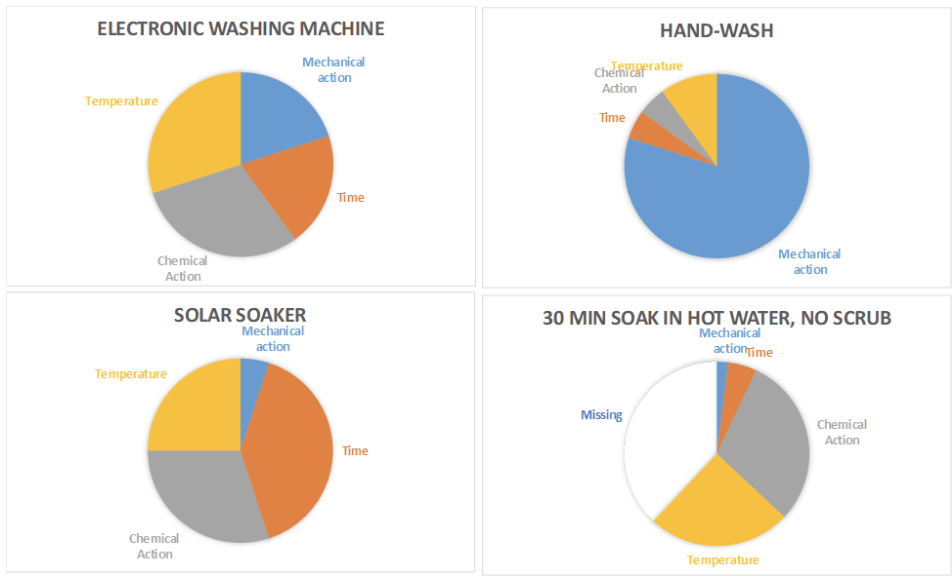Our solution
The Solar Soaker substantially reduces the time spent doing laundry, we aim to reach as many women as possible by ensuring affordability and availability.
The Solar Soaker is not an electrical washing machine, so it doesn’t need power. The lid lets the radiation of the sun through but the heat can’t leave hence it warms up. This is similar to greenhouse processes. The Solar Soaker and foil are black in order to enhance this process and protect the clothing.

The SolarSoaker in use.
The enzymes in the auto-detergent are heat-activated and start separating dirt from laundry items once the water heats up. This process starts from approximately 25-30 degrees Celsius. Our pilots have shown temperatures reached between 35 and 55 degrees, depending on weather and soaking (heating) time. Even on overcast days, the device reaches high enough temperatures to be effective (35 degrees).
A real time saver
Even though the Solar Soaker is not a ‘machine’, it saves users from hand wash efforts and involves a new way of washing. It requires users to prepare the Solar Soaker according to instructions (mix water and a small amount of auto-detergent, add laundry) and then leave it for 1-3 hours (depending on weather). Afterwards any remaining stains can be treated with the built-in rubbing board and laundry items need to be rinsed (once). For many women this requires a shift in washing behaviour. Our agents provide demonstration and training to create awareness and understanding of this new way of washing.
Impact
Recent studies have confirmed impact potential for the Solar Soaker. Our pilot projects, in Uganda and Kenya, where the Solar Soaker was used in both household settings and in dobbies (informal laundry shops), have provided very positive consumer and washer feedback in terms of:
- 2/3rd of time saved
- 90% reduced physical effort
- Cleaner laundry
- Less water usage
- Enhanced freshness and duration of freshness
- Returning clients
- Increased status and self-esteem of washer ladies
- 50% increase of dobbie income
- Job creation
Historical context
In one of his TED talks, the late Hans Rosling makes a case for why the washing machine is the greatest invention of the industrial revolution. The washing machine vastly reduced the amount of work needed for household chores, and this gave especially women time to spend on education and to enter the labour market. This revolutionized the structure of society in western countries. According to Cambridge University economist Ha-Joon Chang, in terms of the consequent economic and social changes, the internet revolution has (at least as yet) not been as important as the washing machine.
The impact of the washing machine has also been scientifically studied by historians. For example, Pirani, Leon and Lugauer (2008) found that ownership of washing machines, dryers and freezers increased the participation of married women in the labor market between 1960 and 1970. Cavalcanti and Tavares (2008) used data on the price of home appliances in OECD countries for the period 1975-1999 and found that a decrease in the relative price of appliances has a positive and significant effect on female labor force participation rates in OECD countries.
How it works
The Solar Soaker is a 10 liter basin of recycled plastic with a black plastic foil and a transparent plastic cover. The system is robust and can withstand at least 1500 laundry sessions. The solar soaking process involves:
- dissolving the detergent in cold water
- submerging the laundry
- closing the basin with the cover
- leaving it to soak in the full sun
Heat benefit
The key benefit is that the sun heats up the wash solution to the point where stains and dirt are removed without further need for hand washing, as the key active ingredients in the detergent work best at around 40°C.
Greenhouse effect
This temperature can be achieved in an hour in direct sunlight, but the device heats up effectively without direct sunlight (overcast weather). It uses the physical principles of a greenhouse to capture the heat of the sun. To prevent discoloration of sensitive fabrics, a black sheet of plastic foil is placed on top of the clothes. The device includes an integrated rubbing board to remove occasionally remaining stains or to wash when less sunlight is available.
Sinners Circle
The figure below shows the technical principle using ‘Sinners Circle‘ (named after the chemist Herbert Sinner that introduced it). Technically, the cleaning performance of a washing process is determined by temperature, mechanical action, chemistry and time. Sinners Circle explains that all these four factors can be almost freely selected and weighted as required, but a reduction in one factor needs to be compensated by an increase of another factor, so that the ‘circle’ is completely filled.

Summary
The Solar Soaker is a laundry innovation that uses significantly less mechanical action than hand-wash. Although it saves a lot of time, it uses the time effectively by soaking with enzyme-rich detergent, which is activated in warm water. Compared to hand-washing it is quite a new way of washing, which actually comes close to the ways of an electronic washing machine (on a long washing programme).

Who we are looking for
We partner with individuals and organisations that share and contribute to our objectives. We are eager to be in contact with manufacturers of moulds, plastic basins (preferably from recycled plastics), and detergents. We are partnering with local distributing networks and transporters. Our agents are active in both rural and urban areas, where we work with community based organisations, savings groups and NGOs.
Send us a message below!

Contact Information
Email: contact@solasoka.com
Other
Site and design by Tom Flendrig
Copyright 2021 SolaSoka
